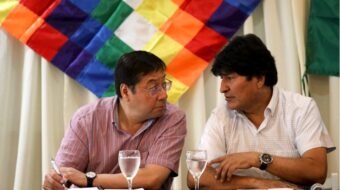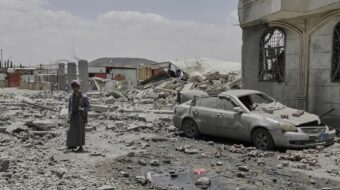Iraq: Healing the past and present
The Iraqi Mobile Communist Clinic brought its medical expertise to the people in a special way on Communist Martyr Day, Feb. 14. The clinic set up shop in Baghdad at the same spot where a well-known Iraqi Communist Yousuif Salman Yousif (“Fahad”) was publicly executed in 1949.
Under a banner marking the anniversary, the clinic treated patients, dispensed medicine and gave medical advice from the moment the doctor put on his white coat, signifying his profession.
The Iraqi Communist Party daily paper, Tareeq Al-Shaab (People’s Path), reported that when a traffic police patrol came to see what was going on, they stayed to help organize the crowd into a waiting line.
Altogether, the medics gave medical assistance to about 220 people over a three-hour period, most of whom were elderly and poor. When praised for their efforts, they replied, “We are only carrying out our duty as Communists in helping the people.”
India: Recycling plastic waste
Discarded plastic bags are a major pollutant in many countries of the south. They clog drains, litter streets, fill city dumps and choke the soil.
In Delhi, recycling plastic waste has become a viable micro enterprise employing 300 women with profits of $150,000 each year.
Backed by a newly formed nongovernmental organization called Conserve, bags are collected from city streets, washed and sorted before they are molded into colorful plastic sheets that are stitched into bright, attractive women’s handbags.
National legislation banned the production, storage, use, sale and distribution of the bags in India, although the northern state of Himachal Pradesh has been the first to enforce the law. Violators face up to seven years in prison and the equivalent of a $2,000 fine. In May 2005, South Africa banned the use of thin plastic bags, threatening a jail sentence of up to 10 years.
Ecuador: People vs. oil
The Amazonian Napo Province went under a presidential-declared state of emergency last week as conflict between indigenous of the eastern Amazon and the Ecuador pipeline brought oil production to a halt.
The state of emergency, according to the Associated Press in Ecuador, “gives police and the military the right to make arrests and conduct searches without warrants.” The order was denounced by the parliamentary official representing the region, Napo Deputy Domingo Tanguila.
OCP, owned by a U.S., Canadian and Argentine group, is one of two pump lines in Ecuador that account for 43 percent of the national budget, according to the Canadian Press.
The Ecuadorian Amazon Region has long been the scene of controversy between oil companies and indigenous communities.
In 2003 ChevronTexaco was involved in a billion-dollar lawsuit for dumping toxic materials into unlined pits and polluting the Amazon rivers, according to BBC News.
Chad: Darfur refugees seek peace
The Gaga Camp in eastern Chad is one of 12 refugee camps set up along the insecure border with Darfur, Sudan. In the past two months, more than 1,000 people of all ages have sought refuge there from a new wave of attacks by armed, Arab nomadic militias known as Janjaweed.
For many, it is the second or third move they have made in search of a safe place to live.
“We are so tired of the attacks and having to move on,” one young woman with six children told the UN Integrated Regional Information Network. “All I want now is to stay in one place, build and live, have food and be safe.”
Milaiti Ruben, Gaga camp manager from Africare, said he expects the numbers will increase.
“The stream will continue because insecurity reigns along the border,” he told IRIN. “And the simplest way for people to protect themselves is to flee.”
World Notes are compiled by Pamella Saffer (psaffer@pww.org).









